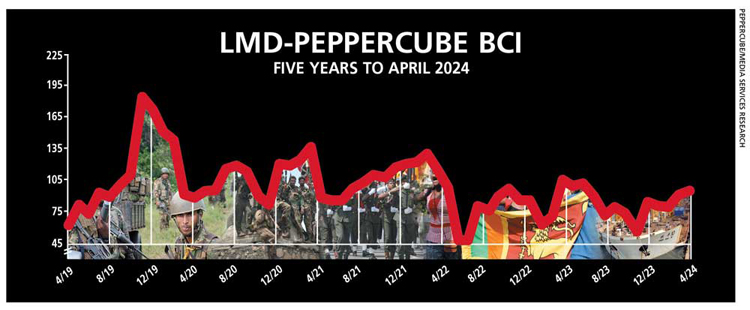
Business Confidence Grows for Second Consecutive Month Amid Lingering Challenges

Business confidence in Sri Lanka has strengthened for the second consecutive month, although challenges on the horizon persist. The nation faces a pressing deadline to finalize agreements with creditors, including bondholders, to align with the anticipated disbursement of the third tranche of the IMF’s Extended Fund Facility (EFF), scheduled for June, totaling US$ 337 million after the third review of the program.
Amidst these circumstances, a recent World Bank report highlighted a surge in poverty over the past four years, escalating from 11 percent in 2019 to approximately 25 percent in 2024. President Ranil Wickremesinghe has advocated for legal system modernization to facilitate the effective implementation of government economic reforms aimed at stimulating growth.
The Asian Development Bank’s (ADB) Asian Development Outlook (ADO) for April 2024 forecasts moderate growth for Sri Lanka, predicting a growth rate of 1.9 percent in 2024 and 2.5 percent in 2025, following two consecutive years of contraction. However, the ADB warns of potential economic downturns due to uncertainties surrounding upcoming elections.

In April, the LMD-PEPPERCUBE Business Confidence Index (BCI) exceeded the 90-point threshold for a second successive month, registering a marginal three-basis-point increase to reach 96. This represents an improvement in optimism among corporates regarding the economy and sales volume expectations over the next 12 months, according to PepperCube Consultants.
However, challenges such as high taxes and interest rates persist for businesses, overshadowing political developments. Furthermore, global uncertainties, including conflicts in Ukraine and Gaza, contribute to rising oil prices towards US$ 100 per barrel, potentially increasing import costs for Sri Lanka.
Looking ahead, the trajectory of the business confidence index remains uncertain amid the prospect of political turmoil preceding elections. Questions linger about the national economy’s direction post-elections and the continuity of ongoing reforms.
Source: LMD


